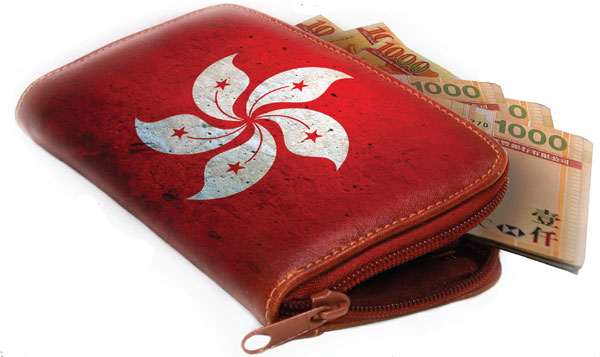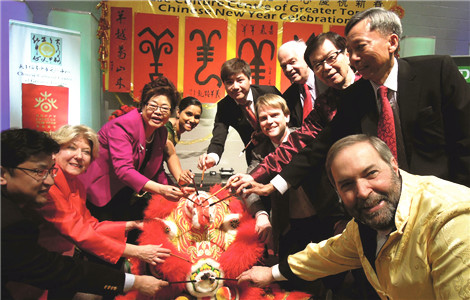Call for wise spending as SAR purse gets fatter
Updated: 2015-03-06 07:07
By Oswald Chan(China Daily USA)
|
||||||||

With the Hong Kong government once again poised to report a much higher than estimated budget surplus for the 2014-15 fiscal year, analysts believe the money should be spent wisely to cement long-term competitiveness of the city's tax regime and maintain economic resilience. Oswald Chan reports.
When Financial Secretary John Tsang Chun-wah announces the government Budget on Feb 25 for the 2015-16 fiscal year, he would probably miss the mark once again on his budget surplus forecast, as the administration is believed to have posted a much higher figure than he anticipated for the 2014-15 fiscal year.
Various accounting firms estimate the government will run up a huge budget surplus, much larger than its revised estimate of HK$9.1 billion (Table 1), due to higher than expected collections from profits tax, stamp duty revenues, additional revenue through the Double Stamp Duty introduced in 2013 as a property-cooling measure, as well as the administration's over-estimates on expenditure.
As a result, the administration is predicted to accumulate a total fiscal reserve of over HK$800 billion by the end of March 2015 - equivalent to 30 months' government expenditure at maximum (Table 2).
Despite the windfall, accounting advisory firms and professional bodies are opposed to the government announcing cash handouts once again. Instead, they feel, it should prudently consider ways to make good use of the huge fiscal reserves to safeguard Hong Kong's economic competitiveness and help families and the community.
Ernst & Young (EY) has proposed a package of fiscal relief measures to alleviate the financial burden of individual taxpayers and local enterprises that would cost the Hong Kong government a total of HK$7.3 billion. The accounting advisory firm also proposes another HK$2 billion in relief packages, in the form of profits tax reduction, utility charge concessions and a one-year licensing fee waiver, to help local businesses affected by the Occupy Movement last year.
Also, accounting advisory and professional bodies across the board have called for the introduction of more financial relief measures to reduce the fiscal burden of the city's middle class and working public (Table 3).
Besides individual taxpayers, the city's business firms also deserve to be helped, these bodies say, especially small and medium-sized enterprises, which are the backbone of the economy (Table 3).
"Factors that we considered included the rising cost of living that families face in Hong Kong, the need for people to develop new skill sets to succeed in a knowledge-based society and, in the medium and longer term, the importance of encouraging individuals to plan better for their retirement," said Florence Chan Yuen-fan, taxation faculty executive committee chairwoman at the Hong Kong Institute of Certified Public Accountants (CPAs).
And Ayesha Macpherson Lau, tax partner in charge at KPMG, said:"Revenues from tax collection, investment income and land sales fluctuate severely with the global economic situation. Despite holding around HK$800 billion of reserves in hand, the government should continue to pursue a prudent approach and spend its money wisely to improve Hong Kong's competitiveness."
"All the above burden-alleviation measures should go hand in hand with a comprehensive review of the city's tax regime to enhance Hong Kong long-term economic competitiveness," Lau added.

 Living amid the mountains
Living amid the mountains
 Plane skids off LaGuardia runway during snowstorm in NYC
Plane skids off LaGuardia runway during snowstorm in NYC
 The Legend of Mulan told at Lincoln Center
The Legend of Mulan told at Lincoln Center
 Six things you may not know about Awakening of Insects
Six things you may not know about Awakening of Insects
 Top 10 favorite gift brands of rich Chinese men
Top 10 favorite gift brands of rich Chinese men
 Buddha statue with mummified monk is museum draw
Buddha statue with mummified monk is museum draw
 Across Canada March 4
Across Canada March 4
 Seven things you may not know about Lantern Festival
Seven things you may not know about Lantern Festival
Most Viewed
Editor's Picks

|

|

|

|

|

|
Today's Top News
Birthing centers mum after raid in California
4 Chinese students look to take 'risk'
China likely to maintain 7% growth for 20 years
China's top two train makers to merge
Finance Minister: no spending spree
US fails to grasp China's terror laws
Militaries' cooperation 'key' in ties
China, California address climate, energy issues
US Weekly

|

|







